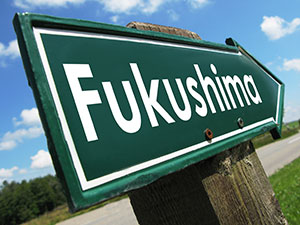

To Your Health: NLM update Transcript
Are thyroid abnormalities common among youth?: 05/09/2016

Image: Reproduced by permission ofChem. World, 25 January 2013,http://www.rsc.org/chemistryworld/2013/01/reassessing-health-effects-fukushima-daiichi-nuclear-accident
Greetings from the National Library of Medicine and MedlinePlus.gov
Regards to all our listeners!
I'm Rob Logan, Ph.D., senior staff, U.S. National Library of Medicine (NLM).
Here is what's new this week in To Your Health - a consumer health oriented podcast from NLM - that helps you use MedlinePlus to follow up on weekly topics.
While screening for thyroid illness among young persons who live near the Fukushima nuclear power plant has found nodules or cysts in about half the 300,476 participants, the interpretation of the findings has taken a surprising turn, finds an article recently published in Science.
The article suggests among young persons under 18 who were screened after a 2011 meltdown at the Fukushima, Japan nuclear power point, almost half have solid nodules or fluid-filled cysts on their thyroids.
While the article notes about 110 cases of thyroid cancer among those screened have been identified, the screening also may have discovered that thyroid abnormalities are more common than previously expected — and thyroid cancers occur earlier in children than previously understood.
To backup, the population near the Fukushima, Japan power plant was exposed to radiation after the facility was significantly damaged during a March 2011 earthquake-spawned tsunami. The plant experienced equipment failures, which caused nuclear meltdowns and the release of radioactive materials. The tsunami caused catastrophic damage within populated areas adjacent to the Fukushima plant.
Although the failure of the nuclear power plant in Fukushima was the largest since the Chernobyl disaster in 1986, the article explains the release of radioactive materials was about 90 percent less than what occurred at Chernobyl.
The article notes the screening of the Fukushima area's young persons began as a precaution because prior research suggested an elevated risk of thyroid cancer from exposure to radioactive materials.
Initially, the Science article notes area public health officials were alarmed by the high number of cancer cases — and elevated number of post-exposure, area children with abnormal thyroid conditions.
However, the article explains the current interpretation of the data is the high incidence may not be as unusual as first perceived. In fact, recent comparative screenings of young Japanese in two areas (where they have not been exposed to radiation) suggest the prevalence of abnormal thyroid in all three areas is statistically similar. Regarding the comparative number of cancer cases, the article adds (and we quote): 'The prevalence of thyroid cancer detected by advanced ultrasound techniques in other areas of Japan does not differ meaningfully from ...Fukushima...' (end of quote).
While the article notes finding thyroid lesions in children fosters understandable anxiety, the surprising, revised interpretation is an abnormal thyroid is far more common among Japanese children than previously understood.
While one interpretation of the newer, comparative Fukushima data is thyroid screenings may be counterproductive, the article concludes that recent efforts may yield a better understanding of the origins and development of thyroid growths, which could prompt better treatment.
Meanwhile, a guide to thyroid cancer treatment for children (from the American Academy of Head and Neck Surgery) is available within the 'children' section of MedlinePlus.gov's thyroid cancer health topic page. The National Cancer Institute provides a guide to what you need to know about thyroid cancer in the 'start here' section of MedlinePlus.gov's thyroid cancer health topic page.
The National Cancer Institute also provides a guide to the cancer risks from nuclear power plant accidents within the 'related issues' section of MedlinePlus.gov's thyroid cancer health topic page.
MedlinePlus.gov's thyroid cancer health topic page additionally provides links to the latest pertinent journal research articles, which are available in the 'journal articles' section. Links to clinical trials that may be occurring in your area are available in the 'clinical trials' section. You can sign up to receive updates about thyroid cancer as they become available on MedlinePlus.gov.
To find MedlinePlus.gov's thyroid cancer health topic page, please type 'thyroid cancer' in the search box on MedlinePlus.gov's home page, then, click on 'thyroid cancer (National Library of Medicine).'
Before I go, this reminder... MedlinePlus.gov is authoritative. It's free. We do not accept advertising .... and it is written to help you.
To find MedlinePlus.gov, just type 'MedlinePlus.gov' in any web browser, such as Firefox, Safari, Chrome, or Explorer, on any platform.
We encourage you to use MedlinePlus and please recommend it to your friends. MedlinePlus is available in English and Spanish. Some medical information is available in 48 other languages.
Your comments about this or any of our podcasts are always welcome.
Please email the podcast staff anytime at: NLMDirector@nlm.nih.gov
A written transcript of recent podcasts is available by typing 'To your health' in the search box on MedlinePlus.gov's home page.
The National Library of Medicine is one of 27 institutes and centers within the National Institutes of Health. The National Institutes of Health is part of the U.S. Department of Health and Human Services.
A disclaimer — the information presented in this program should not replace the medical advice of your physician. You should not use this information to diagnose or treat any disease without first consulting with your physician or other health care provider.
It was nice to be with you. Please join us here next week and here's to your health!





















.png)












No hay comentarios:
Publicar un comentario